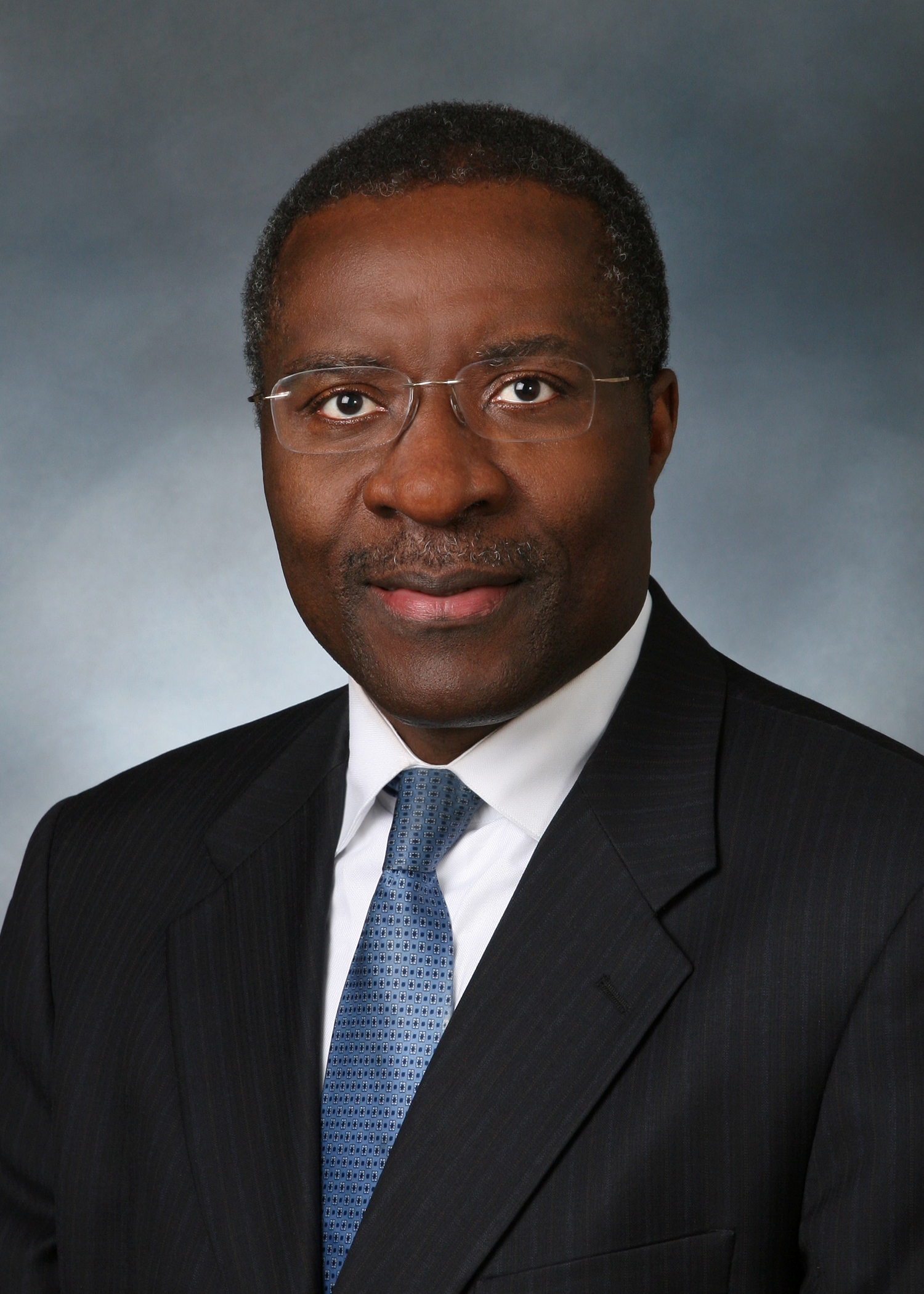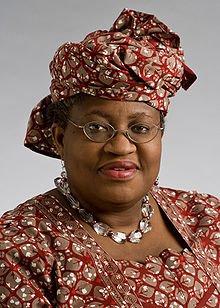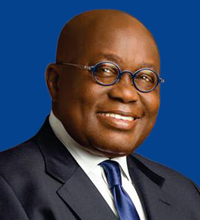Africa and Global trends of the 21st century: Challenges and Opportunities
Monday May 12, 2014
Speech delivered by Dr Christopher Fomunyoh during his visit to the Arnold Bergstraesser Institut, University of Freiburg, Germany
Dr Christopher Fomunyoh Senior Associate for Africa at the National Democratic Institute (NDI)
"It is to be noted that failing economic development; high youth unemployment; deindustrialization (in Northern Nigeria, Boko Haram); limited education and training opportunities; and low access to participation in governance provide the breeding ground and swamps in which these extremist groups thrive. Collectively, as the world fights these groups, we must also focus on draining these swamps" Dr. Fomunyoh

I would like to thank ABI for giving me the opportunity to discuss a topic that is dear to my heart, namely: how Africa is coping with the many global trends of the 21st century. I cannot tell you how honored I am to be here at ABI, a highly respected institution with a very impressive research curriculum and a broad international outreach that guarantees considerable attention to pressing international issues, attracting in the process a lot of international students and practitioners. ABI's integrative approach that combines scientific research, applied development research, and the training and further education of development experts values the kind of opportunity we have today where a practitioner like me can reflect and share ideas with you all on global trends affecting the continent of Africa.
First let me provide some context by discussing Africa's contribution to the world.
According to the Population Reference Bureau, as of 2013, the total population of Africa is estimated at 875 million, representing approximately 15% of the world's population. According to a recent study by the Pew Research Center (Feb. 2014), it is projected that by 2050 the population of Africa would have more than doubled and hence increased the most globally to make up a greater share of the world's population. Around 40 percent of the population in most sub-Saharan African countries is below 15 years old. In countries such as Mali and Uganda, close to 50 percent of the population is in the below 15 years old bracket compared to only 20 percent in the USA and approximately 13 percent for Germany. Africa is therefore a youthful continent.
Africa remains a viable trading partner. Undeniably, a German-African partnership would be mutually beneficial as industrialization remains a priority for many African governments even if the surge in Chinese interest in Africa has flooded African markets with cheap products that have in many cases (such as Northern Nigeria and Zambia) stifled the nascent private sectorin the textile industry.
Germany has been, and remains, one of the most important bilateral partners for sub-Saharan Africa. Moreover, a sizeable share of German development assistance today supports regional integration and capacity building.
Between 2002 and 2012, the imports from Germany to sub-Saharan Africa increased by over 133 percent, going from $100 billion to over $350 billion. Exports from the region to Germany have also risen by a similar magnitude. The top three export categories from Germany to Africa are machinery, manufactured goods and chemicals. Germany has, over time, increased its imports of fuel-based commodities from Africa. Indeed, the top three imports from Africa into the German market are fuel - which represents over 75 percent of all imports - agriculture commodities and some manufacturing.[1]
Africa therefore remains a viable trading partner with a multiplicity of untapped mineral resources. For example, Guinea Conakry with a population of 12 million people is the world's second largest producer of bauxite and has rich deposits of diamonds and gold. In bauxite production, Guinea comes after Australia, but at the same time, Guinea maintains the highest bauxite reserves in the world far ahead of Australia. Ghana and South Africa figure prominently among the top ten gold producing countries in the world. Five African countries - Cote d'lvoire, Ghana, Nigeria, Cameroon, and Togo - are among the top 10 world producers of cocoa. Five others - Ethiopia, Cote d'lvoire, Uganda, Cameroon and Togo - are among the top ten world producers of coffee. Gulf of Guinea countries that include Nigeria, Gabon, Congo Brazzaville, Equatorial Guinea and Angola, account for close to 20 percent of oil imports into the United States; and new technology in oil exploration and production is contributing to new oil discoveries in countries such as Mauritania, Chad, Ghana, Cote d'lvoire, Uganda, Kenya, Tanzania, Mozambique, and even Niger.
Take a look at the mineral map of the DRC - cobalt, coal, natural gas, nickel, diamonds, gemstones, gold, water resources for hydro-electric purposes, just to name a few. These rosy stories of macro-economic trends and economic potential on the African continent can also be amplified by some of the gains with regards to democratic transitions in the last two decades.
Since the late 1980's and the advent of the third wave of democratization ushered in after the collapse of the Berlin Wall and the end of the Cold War, Africa witnessed the achievement of independence by Namibia in 1989/1990, the end of apartheid in South Africa and release of Nelson Mandela in 1991, and the fall of many military and autocratic regimes.
In fact, in 1990, Freedom House, which ranks freedoms around the world, rated only four African countries as partially free or democratic. Today, Freedom House rates about 11 African countries as totally free and another 19 as partially free, for a total of about 30.
In 1990, only three African Heads of State had relinquished political power and still lived in their countries -Julius Nyerere of Tanzania, Sedar Senghor of Senegal, and Ahmadou Ahidjo of Cameroon. Today, over 40 former African Heads of State live on the continent, many of whom either voluntarily relinquished power, were term limited in newly adopted progressive constitutions or lost presidential elections and accepted the outcome; thereby facilitating the renewal of political leadership in their respective countries.
In today's Africa, unlike two decades ago, civil society is vibrant and seeks to play an advocacy role; human rights organizations exist and regularly denounce the gross violations of human rights by the dozen or so remaining autocratic regimes; and independent media that includes community-based radio stations and print media provide opportunities for diverse viewpoints and dissenting voices to be heard.
In today's Africa, women are increasingly demanding, and obtaining, the right of access to elective office. The proof is that today in Africa; we have three women heads of state -- in Liberia, Malawi, and the Central African Republic -- with the elected chair of the African Union Commission also being a woman.
Indeed, many African countries have made considerable progress in the past two decades:
· Renewal of political leadership
· More credible and transparent elections
· Emergence of Independent National Elections Commissions
· Vibrancy of domestic observers' groups
· Emergence of new institutions with charters that emphasize the rule of law, democracy and good governance (ex of the AU Charter of 2007) and sub-regional entities such as ECOWAS, IGAD and SADC with protocols, which expand markets by allowing for free trade and free movement of persons and goods.
Bottom line: Africa is not a poor continent. Indeed, it is a rich and wealthy continent both in human capital and natural resources; but it is the poor management of these resources that causes extreme poverty on the continent, and an ever expanding gap between the rich and the poor.
And, yes, in still too many African countries, the rich in many cases are not young, dynamic, hardworking entrepreneurs; but rather old corrupt autocrats and their cronies who feed from the public treasury and exacerbate the levels of corruption.
So the rosy picture pointed earlier does not tell the full story of today's Africa. A lot is still desired of Africa's political leadership as the continent continues to struggle with bad governance, violence and armed conflict that destroy human lives and dilapidate material resources. At the same time, the continent is now being exposed to other emerging global threats such as terrorism and climate change, which it is ill prepared to tackle single-handedly.
1. Conflict
In sub-Saharan Africa, trends show that inter-state conflict has been declining whereas intra-state conflicts have been on the rise. Between 2002 and 2005, the number of state-based conflicts in sub-Saharan Africa dropped by 60 percent. However, in 2005, more than 50 percent of the world intra-state conflicts occurred in Africa, even as that represented a sharp decline in the number of wars since the 1990s. (UCDP/Human Security Database)
As we see more intra-state conflict, the nature of conflicts has changed to become more asymmetric. Increasingly, the lines between criminal and political violence are becoming blurred. Whether it is in Somalia, South Sudan, Darfur, CAR, Northern Mali or the DRC, conflicts are becoming more fragmented with an increasing number of non-state actors involved in conflicts, often moving across what we all know to be very porous national borders. There is a growing and disturbing convergence and connection between networks of organized crime, drug trafficking, illicit activities, money laundering, kidnapping, and terrorism.
Violence directly associated with elections has increased along with the rise in political contestation before, during and after polls, especially in settings where the commitment of political elites to democracy is weak, as illustrated by elections in Zimbabwe in 2005 and 2008 (200 casualties, tens of thousands displaced) then Kenya in 2007 (with over 1,000 deaths), in Nigeria in 2011, and Cote d'lvoire in 2011 with over 3,000 deaths and close to one million internally displaced.
These examples speak to the perpetual latent conflict and tensions that surround political competition and the management of political power in still too many African countries. The tendency by some political elites to view elections as a zero-sum game or "winner take all" and to arrogate to themselves all levers of political and economic control causes frustrations that often burst to the surface in violent manifestations or attempts to seize power through non-democratic means.
In post-conflict situations, elections are crucial for choosing who will obtain the legitimacy to govern. In many of these environments, nascent and still fragile governments have to tackle grievances that relate to national reconciliation, unemployment, ethnic marginalization, as well as access to livelihood resources, such as land and water. Indeed, there is evidence that in weak states, competition over scarce resources (either because of climate change or access to commodities such as minerals and oil) often leads to violence. In 2010 and 2011, conflicts over resources accounted for approximately 35 per cent of all conflicts in sub-Saharan Africa.[2]
There is no doubt in my mind that while the youthful population of Africa is an asset, the high percentage of youth in poverty increasing the risk of conflict, particularly when young people lack opportunities for gainful employment or to lead meaningful lives.
2. Terrorism
Since the last decade, African countries are being challenged by transnational terrorist groups that seek to use certain regions of the continent, notably the Sahel and the Horn, as launch-pads for attacks against domestic and international targets in the name of religious extremism. In many ways, the terrorism threat in Sub-Saharan Africa, which has flared up in recent years has benefited from certain global conditions such as:
· the emergence of extremist ideologies, exploiting social media and easily accessible information sharing environment with Djihadism from the Middle East trickling over into Africa, and the proliferation of light weapons across the porous continent after the first phase of the Libyan crisis and overthrow of Moummar Kaddafi, and the djihadist explosion in Northern Mali and Boko Haram in North Eastern Nigeria.
It is common knowledge that al-Qaeda in the Islamic Maghreb (AQMI) was launched initially by elements that fought to overthrow the Algerian government in the early 1990s, but in recent years, have consolidated their activities across the Sahel region, particularly in northern Mali. More recently, the emergence of Boko Haram in North Eastern Nigeria is having a devastating impact on neighboring countries such as Niger and Cameroon.
In the same manner, the activities of Al-Shabaab in Somalia are likely to also destabilize Kenya and other countries in the Horn and East Africa.
It is to be noted that failing economic development; high youth unemployment; deindustrialization (in Northern Nigeria, Boko Haram); limited education and training opportunities; and low access to participation in governance provide the breeding ground and swamps in which these extremist groups thrive. Collectively, as the world fights these groups, we must also focus on draining these swamps.
3. Governance
Africa is still plagued by issues of corruption, lack of credible political transitions, and marginalization of its poorest communities. Without effective political leadership and the appropriate delivery of services to citizens by the state, the prerequisites for development would never be met, and the Millennium Development Goals would remain a distant illusion. To have sustained economic growth, Africa needs inclusive economic institutions and viable political systems capable of creating an enabling environment for private sector investments and exercising proper oversight. In short, it is not just about having a nation state in name, but, more importantly, today’s debate should particularly be about how the state is governed.
· Autocratic regimes (Zimbabwe, Cameroon, Burkina Faso)
Countries that have had the same leader for close to three decades or more, coupled with a one party dominance and a weakened opposition - such as Cameroon (32 years), Burkina Faso (27 years), Zimbabwe (34 years), Equatorial Guinea (35 years), and Angola (35 years) - these regimes create conditions for political decay and stifle opportunities for the renewal of political leadership. Although these regimes sometimes put on national elections to mirror the existence of democracy, the distinction between genuine democracy and the facade that is frequently displayed is quite apparent.
· Constitutions without constitutionalism (Burundi, Burkina Faso, Algeria, DRC)
Many political transitions in Africa fail because incumbent heads of states try to retain political power for life or in perpetuity and at all costs. They therefore manipulate the constitutions of their respective countries to extend their mandates indefinitely. If the constitution, which should be the bedrock or foundation of every society can be manipulated at will, the enforcement of any other laws or regulations (and processes or systems) fails in comparison. Even private investorsthen would worry that the rules on commercial transactions and other engagements could be changed at the whims of one man or of a tiny circle of oligarchs.
Often, these actions gravely frustrate the democratic aspirations of the younger generation of Africans. In some cases, these leaders hold flawed elections that invariably lead to violence and conflict: Zimbabwe (2008) Kenya (2007) Cote d'lvoire (2010). Invariably, a government with questionable' legitimacy is less likely to build the national consensus needed to deliver effective social services to citizens and generate or sustain long-term economic growth and development. On the contrary, such a government devotes public resources to sustaining a system of patronage, prebendalism and corruption, without which its stay in power becomes tenuous.
· Non-inclusive politics
Unfortunately, in many African countries, the politics of exclusion remains a reality of daily life. Apartheid may have collapsed in South Africa in the 1990's, but in many an African country, identity politics buttressed by subjective elements such as ethnicity, region of origin, and in a few cases religion, deprives many African countries of the expertise and experience of some of the best of their fellow citizens.
Many groups are still marginalized or disenfranchised, especially women and youth. Poor governance is notably acute in post-conflict societies where political leadership is weak and ineffective, and issues such as disarmament, demobilization, reintegration of armed groups, national reconciliation and economic reconstruction are not being dealt with. No wonder then that the recovery period can be long and painful in countries such as Angola and the DRC, or that countries relapse into conflict because they haven't come to closure with the past to avoid further conflict as we now see in South Sudan.
4. Conclusion
Despite this list of challenges, I see several opportunities for tomorrow’s Africa, and my optimism for the continent’s future is unwavering. Let me conclude by pointing to two areas that I believe will determine, significantly, the wave of thefuture for Africa.
Youth and technology
Today’s era of globalization has witnessed a boom of new technologies. Financial flows together with innovation create markets that foster growth; and one of the biggest growing sectors on the continent is the information and communications technology sector (ICT).
In 2014, several reports indicate that, globally, investments in the ICT sector will increase only in Africa. Countries such as Kenya, Ghana, Rwanda, Tanzania, South Africa and Nigeria, have made huge investments in ICT infrastructure working in partnership with international agencies, ICT vendors and researchers. This is no surprise, as Africa is also home to 200 million youth between the ages of 15-24; a number that could double by 2045 according to the African Development Bank. This age group is the biggest consumer of technological goods, and as they grow in numbers, so does the demand in this sector. The demographics are a real asset for Africa.
The new generation of young Africans being more tech oriented and tech-savvy, are poised to contribute meaningfully to positive changes to the development trajectory of Africa, thereby stimulating gains in human development, economic growth and citizen advocacy and participation in politics. This next generation of Africans looks at the world from a more global vantage point with less cumbersome constraints and pressures from traditional reference points.
Migration and the role of the diaspora
Young Africans are extremely mobile often traveling to North America, Asia, and Europe for further studies or to pursue private professional career opportunities. The human resources and strategic potential of the African diaspora needs to be harnessed to promote responsible, transparent, accountable and democratic systems of governance on the continent. There is the size and positive developmental impact of financial remittances, but equally important to note that the African diaspora portents non-financial attributes that should be leveraged to influence positively on the development of their homelands, and significantly contribute to improving lives on the continent (Ex. Somalia, Peace- and state-building programs in Somalia). Nothing should be allowed to stop the African diaspora from contributing to democratic governance in much the same way that they currently contribute to economic welfare and development in their home countries. They can do so by making their knowledge, practical experience, professional expertise, and transnational relationships available for strengthening the capacity of political institutions.
One cannot forget the historic role of the first wave of the African diaspora when it returned to the continent in the 1950's and early 1960's to join the struggle for independence. One must remember that leaders such as Kwame Nkrumah who became president of Ghana - the first country in Sub-Saharan Africa to win independence; Nnamdi Azikiwe of Nigeria who launched the first political party in West Africa (the National Council of Nigeria and the Cameroons); Sedar Senghor of Senegal, Houphouet Boigny of Cote d'lvoire; Ahmadou Ahidjo of Cameroon - who became the first post-independence presidents in francophone Africa after serving in French institutions in Paris; Tom Mboya of Kenya who studied at Oxford University and went back to lead negotiations with the British over the independence of Kenya; and many other Africans of that generation played significant roles that remain a legacy of political and visionary leadership on the continent. Today's diaspora must be ready to take on the mantel, for that too is required in shaping the destiny of Africa in this 21st century.
Thank you for your time and attention.
Dr. Christopher Fomunyoh
Senior Associate for Africa
National Democratic Institute for International Affairs (NDI)



